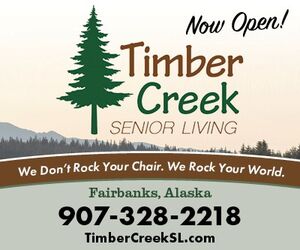November is National Alzheimer's Awareness Month
November 1, 2018
Alzheimer’s disease is daunting. The most common cause of dementia, Alzheimer’s affects over 7,500 Alaskans and 5.7 million Americans today. Research is being done around the world to detect and stop the disease in its earliest stages. At the same time, specialists are working to provide individuals and families with an arsenal of techniques and resources to ensure comfort, dignity and purpose as the disease progresses.
Alzheimer’s disease can be found throughout history in stories of elders losing their memory. Until recently, this was thought to be a normal part of aging. It wasn’t until 1906 that it was first documented as a disease by Dr. Alois Alzheimer, who noticed the symptoms in a relatively young patient. On autopsy, he found plaques built up in the brain; these have become the hallmark identifiers of the disease. Awareness of Alzheimer’s increased in the 1970s and 80s when doctors and scientists realized the magnitude of the disease. Today it is considered the sixth leading cause of death regardless of age. For the majority of cases, there is no clear cause or genetic link. Risk factors include age, genetics, and overall health, though no one risk factor guarantees developing the disease. Most people who develop the disease are aged 65 and over; however, about four percent of those with the disease are in their 40s and 50s.
One of the first symptoms of Alzheimer’s disease is short term memory loss. This includes difficulty remembering appointments and new names, as well as some trouble learning new tasks or navigating new areas. But the disease is more than just memory loss. As it creeps through the brain, the disease gradually affects all aspects of cognitive function and thought, including decision making, control of emotions, judgment, language and the ability to understand surroundings and filter information. The disease is fatal and can last anywhere from two to twenty years depending on other health concerns.
Current research covers everything from early detection and prevention to drug therapies aimed at stopping or reversing the disease. New discoveries in brain imaging and blood tests now allow doctors to diagnose the disease earlier and with greater accuracy. Drug therapies are in various stages of research around the world and give hope doctors will soon be able to stop the disease. Research into healthy aging is increasingly showing that a heart healthy lifestyle is also a brain healthy lifestyle; things like eating well, exercising and remaining socially active all help reduce the risk of developing Alzheimer’s disease and many of the other causes of dementia.
For those affected by this disease, help is available. Local senior centers and health clinics as well as the Aging and Disability Resource Center can provide information and refer families to local service providers. There are national organizations with information that can be accessed online. Care coordinators can be valuable tools for locating services and ongoing resources. In-home supports can assist in keeping a loved one home for longer or maintaining the independence of a senior in their own home.
For more dementia specific concerns, the Alzheimer’s Resource of Alaska is a statewide organization providing education and support for individuals, families, and professionals. Services can include consultations, memory screenings, awareness activities and trainings. To contact the Alzheimer’s Resource of Alaska you can visit their website at http://www.AlzAlaska.org or call 1-800-478-1080 to choose an office near you.
Caregiver support
Caregiving can be a physically, emotionally and mentally draining job. The responsibilities and stresses build up over time and often leave a person feeling isolated, anxious, depressed, angry, or overwhelmed. By connecting through support groups with others experiencing similar issues, caregivers can begin to feel less isolated, and more in control of their situation, as well as get practical advice and share tips with others.
Caregiver support groups are for individuals who have assumed the role of caregiver due to a loved one’s physical or mental challenges and would like to connect with others in a similar situation.
According to specialists at Alzheimer’s Resource of Alaska, this type of support can become “a lifeline to those facing the daily challenges of caregiving”. People coming together to exchange ideas and learn from one another can create a bond, a group strengthened with renewed hope to continue their important journey. Support groups are one important way caregivers can take care of themselves while caring for others.
Support groups are not therapy sessions and are not run by a counselor. They are run by the people attending with the aid of a facilitator to keep the conversation flowing smoothly.
Caregiver support groups are open to all individuals caring for a loved one with physical or mental challenges. Alzheimer’s Resource of Alaska facilitates many in-person and telephone support groups monthly. They are available statewide, including days, evenings, and weekends, and are accessible for rural Alaskans via the telephone.
To find a support group location near you or to learn about telephone support group options visit: http://www.alzalaska.org/event-calendar/ or call toll free 1-800-478-1080 for more information.









